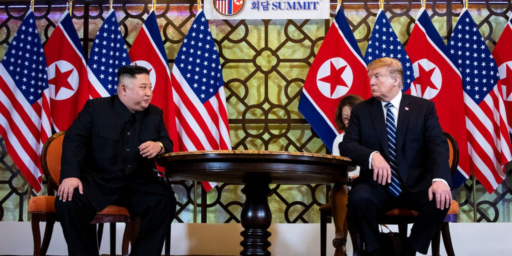Spy Work In Iraq Riddled By Failures
LA Times – Spy Work In Iraq Riddled By Failures
A pair of British-recruited spies in Iraq, whose alarming reports of Saddam Hussein’s illicit weapons were rushed to the White House shortly before the U.S.-led invasion last year, were never interviewed by the CIA and are now viewed as unreliable, current and former U.S. intelligence officials say.
The CIA’s reliance on the two Iraqis, who were recruited by Britain’s MI6 in late 2002 and thought to have access to Hussein’s inner circle, is the latest example to come to light of the failures in human intelligence gathering in Iraq. U.S. agencies were also beset by broader, more systemic problems that included failures in analyzing communications intercepts and spy satellite images, the officials interviewed by The Times said.
U.S. experts, for example, still have not been able to determine the meaning of three secretly taped conversations that Secretary of State Colin L. Powell played to the United Nations Security Council in February 2003 in making the case for war. Investigators have been unable to identify who was speaking on the tapes or precisely what they were talking about.
U.S. analysts also erred in their analysis of high-altitude satellite photos, repeatedly confusing Scud missile storage places with the short, half-cylindrical sheds typically used to house poultry in Iraq. As a result, as the war neared, two teams of U.N. weapons experts acting on U.S. intelligence scrambled to search chicken coops for missiles that were not there.
***
Most important, they say, was the fact that the CIA was unable to recruit a spy in or close to Hussein’s inner circle before the U.S.-led invasion in March 2003. The lack of access was especially glaring because U.S. intelligence had made Iraq a priority target since the 1980s.
“We had zilch in terms of direct sources,” said David Kay, who led the search for chemical, biological and nuclear weapons in Iraq last year as special advisor to CIA director George J. Tenet.
There’s quite a bit more like that in the story, including details of MI-6’s infiltration of the UN inspection teams that provided perhaps the best human intelligence assets we had in Iraq. Some of it is simply wrong, such as the assertion that the CIA “failed to predict Hussein’s invasion of Kuwait in August 1990.” In fact, their assessment was overridden by President George H.W. Bush, whose own human intelligence contacts assured him otherwise.
While much of this is useful, it is underpinned by a rather unrealistic expectation of what intelligence agencies can reasonably accomplish. Calling it a “failure” every time we act on partial information is problematic, as it reinforces the natural bureaucratic tendency to hedge bets. When starting from the premise that Saddam was actively pursuing a weapons program–certainly, a reasonable bet–it’s hardly surprising that a cylindrical storage silo was identified as being used for missiles. The reverse error–misidentifying missile silos as chicken coops–would have been far more catastrophic.
The nature of intelligence is that one is trying to discover information that people are actively trying to hide and then extrapolate future actions. Professional analysts can’t do that particularly well within our own society–where information is freely available and reporters constantly talk to decision-makers.





Well, as we’ve seen, erring in the way we did can have equally catastrophic effects. Sometimes hedging bets is actually the safer thing to do.
Isn’t this why we have laws against vigilantes? And why we have treaties against pre-emptive (i.e. non-defensive) wars? Really, isn’t this precisely the reason why the rule of law is such a good thing?
I’m not sure that we’ve seen catastrophic effects. The cost of toppling Saddam was relatively low, and everyone agrees that it was a good thing.
The jury’s still out on whether it was a good idea to stay around for a year plus trying to build the first Arab democracy, but that wasn’t related to intelligence failures so much as an ideological posture.
Pre-emptive war is widely considered permissible under international law, although not so much under the circumstances we were facing. But I don’t see the correlation between the rule of law–which essentially doesn’t exist beyond the level of the state, anyway–and the quality of intelligence.
I’d cite the Cuban Missile Crisis as a classic case, by the way. We had solid intelligence on missiles–as it turned out–although not much in the way of information on intent. And, certainly, Cuba had every right in the world to have weapons on its territory. We went to the brink of war to keep them from doing so, an entirely pre-emptive action on our part.
That kind of pre-emption is certainly well within the bounds of international law, as I dimly understand it. It was absolutely crystal clear what was there, and what they were doing. It wasn’t speculation as to intent, and it wasn’t speculation as to capability.
And I do wonder at the statement you made regarding the rule of law “which essentially doesn’t exist beyond the level of the state, anyway”. The web of international laws that exist are simply a figment of our imagination? The WTO is just a myth? The laws may not be followed by all, but certainly we pride ourselves in doing so. More importantly, it’s pretty clear that our constitution recognizes this – i.e. treaties become the law of our land. Pretty unambiguous.
As to the quality of intelligence, my point is that due process and following our own rules – such as the treaties we’ve signed which explicitly lay out under what conditions we can wage war – are there for a purpose. And the Cuban Missle crisis is a perfect example of this. We blockaded, which is an act of war, but we didn’t invade and perform a regime change. The threat was far more than what we ever faced from Iraq under even the most threatening scenarios fantasized by this Administration. Instead of dealing with it like level headed human beings, we went off like a bunch of vigilantes who *think* they know who the criminal is, go off and whack the guy, and then later find out he’s innocent.
The “I was just playing it safe” excuse doesn’t work. It just makes one look worse.
—